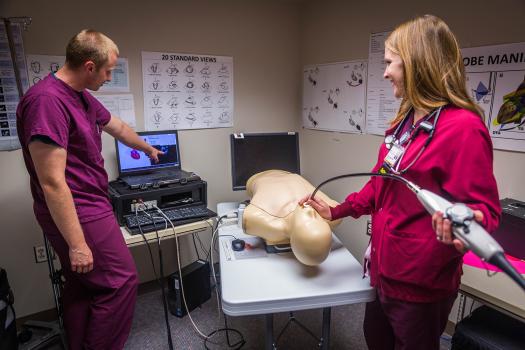
Each year, approximately 1,100 adults and children undergo anesthesia for cardiopulmonary bypass and corrective cardiac surgery at the University of Iowa Hospitals & Clinics. During their cardiovascular anesthesia rotation, residents care for patients with ischemic, valvular, and congenital heart diseases.
Anesthesia residents are exposed to the pathophysiology of heart disease and gain familiarity with inotropic, antiarrhythmic and vasoactive medications. They evaluate critically ill patients and formulate thorough anesthetic plans for a wide variety of cardiac procedures.
Residents also gain an in-depth understanding of the complex physiology of cardiopulmonary bypass and develop proficiency with a variety of invasive monitoring techniques, including arterial pressure monitoring, central venous and pulmonary artery pressure monitoring, transesophageal echocardiography (TEE). Faculty assignments are one-on-one and allow for intensive resident/faculty interaction.
Residents on this rotation also provide anesthesia for patients undergoing thoracic surgery. Anesthetic management in these patients requires a clear understanding of "one lung" physiology and the important techniques of single lung ventilation, fiberoptic bronchoscopy, and central neural-axis analgesia.
Intra-operative TEEs are formally reviewed and interpreted each week by members of our cardiac anesthesia group. TEE reading sessions are open to all residents. Consultation is readily available from both the adult and pediatric cardiology echocardiography service.
Any anesthesia resident at Iowa has the ability to perform and interpret the number of TEE exams necessary to qualify for the Basic PTEeXAM (Basic perioperative transesophageal exam). This certification requires ABA board certification and a permanent medical license (not a training license), but a "preliminary" (Testamur) status can be achieved by passing the written exam and conducting/interpreting the required number of TEE exams. Once you complete ABA certification and have a permanent license, you can convert from Testamur to Certified status.
Didactic material is presented as part of the morning lecture series. A variety of recurring conferences are available, including pediatric surgical indications conference, adult cardiology echo conference, cardiothoracic lectures, and anesthesia TEE conference. Finally, the Department of Anesthesia has a TEE simulator that residents and fellows use to practice ECHO skills.